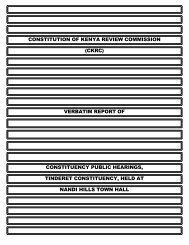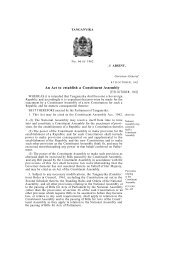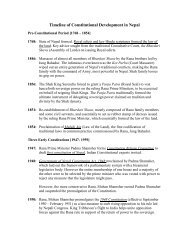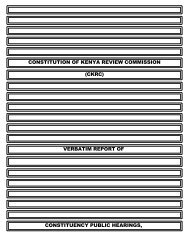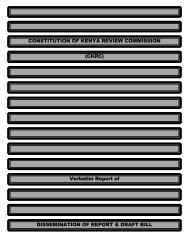constitution of kenya review commission ckrc ... - ConstitutionNet
constitution of kenya review commission ckrc ... - ConstitutionNet
constitution of kenya review commission ckrc ... - ConstitutionNet
You also want an ePaper? Increase the reach of your titles
YUMPU automatically turns print PDFs into web optimized ePapers that Google loves.
Another thing is about our district revenue. Actually our revenues are being taken to the Local Government and we are left<br />
without developing our districts. Why should we collect our revenues and then take to the local government, and it is<br />
distributed unfairly? We should be left to run our own revenue. In any case, we can just get a smaller portion, and in that case<br />
I would be willing to ask the Constitution, to allow the district revenue to be allowed to spend 80% <strong>of</strong> their revenue and may be<br />
then 20% can go to the central government. This is because we feel it is not well distributed when it goes to the central<br />
governmnet, and we are left with bad roads, we are not well paid, the c<strong>of</strong>fee farmers are not paid and so on. I did not have<br />
much, thank you very much.<br />
Com. Wambua: Asanti sana Bwana Kamau. Tinamuita James Mwangi.<br />
James Mwangi: Majina yangu kamili ni James Mwangi, and I have prepared something, a memorandum, but because <strong>of</strong> the<br />
shortage <strong>of</strong> time. I will to go through whatever I have written and finally I will give it to the secretariat committee.<br />
Mine, concerns the rights <strong>of</strong> employees and pr<strong>of</strong>essional equality in Kenya; especially in private sectors. I think those people<br />
maybe who did literature when they were school, there was a book called Animal Farm. Whoever wrote the book entitled<br />
Animal Farm, I think he or she was very right, because she claimed that although all animals are equal, some animals are more<br />
equal than others. My argument as I said is based on pr<strong>of</strong>essionalism, equality and rights <strong>of</strong> employees in the private sector.<br />
The quality <strong>of</strong> an employee, to a large extent, should be gauged by both academic and pr<strong>of</strong>essional qualifications. Because that<br />
is why we have primary schools, secondary schools, colleges and even universities. All this schools, colleges, and universities<br />
admits, trains and <strong>of</strong>fers students respective certificates, depending on students performance. It is because <strong>of</strong> this factor that<br />
you find that two graduate teachers earn the same amount <strong>of</strong> money, irrespective <strong>of</strong> where one is posted to teach by the<br />
ministry. Does this apply when it comes to private sectors? Does the government make any effort to try and investigate, the<br />
plight <strong>of</strong> all employees in private sectors? Do people with the same qualifications, working in the same organization and who<br />
have worked for the same period <strong>of</strong> time, earn the same amount <strong>of</strong> money in that specific sector, or private sector or<br />
company.? Do these private sectors have good salaries structures, good increament polisies, equal and fair fringe benefits?<br />
The answer is a very big no.<br />
I think the government has only the criteria to make sure that, these employees are subjected to statutory deductions like<br />
PAYE, NSSF, NHIF but the goverment does not have any institution or organisation in place, to investigate the problems<br />
faced by these Kenyans. I would like to mention some <strong>of</strong> the problems faced by these employees, who are working in private<br />
institutions, or organizations or companies. Some well established organizations do not have a well defined salary structure or<br />
scale. They therefore exploit Africans, who are desparately looking for jobs, by paying them peanuts, since there is no salary<br />
structure irrespective <strong>of</strong> their academic or pr<strong>of</strong>essional qualifications. You would therefore find that, a trained P1 teacher<br />
earning 45,000/= and it is only that I cannot prove it here, but we all have this data in evidence, while a BED. graduate teacher<br />
earns 18,000/= in an academic institution. A CPA2 Accountant in the name <strong>of</strong> Bursar earning 20,000/=. I can even give a<br />
43






